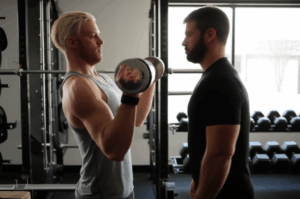In today’s fast-paced world, the pursuit of health and wellness can often feel like navigating a complex maze. With an endless stream of new fitness fads and diet trends constantly vying for attention, it’s easy to become overwhelmed and unsure of what truly works. To cut through the noise, we sat down with a local expert who offered insightful, evidence-based advice on distinguishing effective strategies from fleeting trends for both fitness and healthy eating.

Debunking Popular Fitness Fads: Separating Fact from Fiction
The fitness industry is fertile ground for trends that promise quick results, but many lack scientific backing and long-term sustainability. Our local expert emphasizes the importance of understanding the difference between a genuine fitness trend, supported by research and adaptable over time, and a short-lived fad that often focuses on quick fixes or specific products.
The “No Pain, No Gain” Myth
One pervasive myth is that exercise must be painful to be effective. While some discomfort is normal as muscles work, actual pain signals a problem and should be avoided to prevent injury and burnout. A truly effective workout challenges your body without causing harm.
Spot Reduction and Targeted Fat Loss
The idea that you can target fat loss in specific areas, such as doing endless crunches for a six-pack, is another common misconception. Fat loss occurs throughout the body based on overall activity levels and genetics, not by exercising a single area. Achieving toned abs, for instance, requires a combination of healthy eating, overall fitness, and consistent exercise, rather than just crunches.
Cardio’s Role and Strength Training Misconceptions
While cardio is an essential part of a balanced routine, cardio alone does not significantly increase muscle tone and can burn both fat and muscle. For muscle building, protein intake and regular strength training are crucial. The expert also addressed the myth that strength training will make women “bulky.” This is largely untrue; lifting weights helps build lean muscle mass, which can boost metabolism and overall calorie burning.
Questionable Equipment and Detox Claims
Many fitness fads are tied to specific, often gimmicky, equipment or products. Items like the “Shake Weight” or “Hawaii Chair” have gained viral attention but often lack the versatility or effectiveness for a well-rounded routine. Similarly, “detox teas” that claim to rid the body of toxins and shed pounds typically contain laxatives and diuretics, leading to temporary water weight loss, not true fat loss, and the weight often returns.

Core Principles of Healthy Eating: Beyond the Diet Hype
Just as in fitness, the world of nutrition is rife with “fad diets” that often involve extreme caloric restriction or eliminating entire food groups. Our expert cautions against these, noting they are generally unsustainable, can lead to nutrient deficiencies, and may even encourage disordered eating behaviors like binge eating. Instead, focusing on a balanced, sustainable approach is key.
Emphasize Whole Foods and Variety
A healthy diet should prioritize a variety of foods from all food groups. This includes ample fruits and vegetables (aiming for 5-9 servings daily), whole grains, lean proteins, and healthy fats. Eating for variety and color ensures a broader intake of essential vitamins, minerals, dietary fiber, and antioxidants, which can reduce the risk of chronic diseases like obesity, heart disease, stroke, diabetes, and certain cancers.
Mindful Eating and Portion Control
Beyond what you eat, how you eat is also critical. Mindful eating—paying attention to your body’s hunger and fullness cues without distractions—can help prevent overeating and foster a healthier relationship with food. Controlling portion sizes, rather than severely restricting calories, is a more sustainable path to managing weight. Meal planning can also be a powerful tool for making healthier choices, reducing stress, and saving time and cost.
Understanding Fats, Sugars, and Proteins
- Fats: Emphasize healthful unsaturated fats (like olive or canola oil) and limit trans and saturated fats found in red meat and processed foods.
- Sugars: Limit the intake of free sugars to less than 10% of total energy intake, ideally reducing it further to under 5% for additional health benefits. Opt for fresh fruits over sugary snacks and reduce consumption of soft drinks and other high-sugar beverages.
- Proteins: A “flexitarian” approach to protein is recommended, aiming for at least half from plant sources such as beans, nuts, seeds, and whole grains. Fish, eggs, and poultry can make up most of the rest, with smaller amounts of red meat and dairy. For fitness goals like muscle building, increased protein intake is necessary.
The Importance of Hydration
Often overlooked, adequate hydration is fundamental for both fitness performance and overall health. Aiming for at least 8 cups of water a day and reducing sugary or caffeinated drinks can significantly support your body’s functions.

Building a Sustainable Lifestyle: Consistency Over Perfection
The overarching message from our expert is that sustainable health and fitness are built on consistent, gradual changes rather than extreme, temporary overhauls.
Realistic Goals and Patience
Setting attainable objectives and practicing patience are crucial. It takes time for the body to adapt and for new habits to take root. Focus on progress, not perfection, and understand that occasional deviations are normal.
Incorporating Variety and Enjoyment
Adding variety to both workouts and diet keeps routines engaging, enjoyable, and effective. Trying new activities and exploring nutritional options can challenge different muscle groups and provide a wider range of nutrients, preventing plateaus and boosting motivation. If you enjoy your fitness journey, you are more likely to be consistent.
Seeking Professional Guidance
For personalized advice tailored to individual needs, goals, and any medical considerations, consulting with a certified fitness and nutrition coach or a registered dietitian can be incredibly beneficial. These professionals can help design effective programs, provide accountability and motivation, and offer education to foster long-term healthy habits.
By focusing on evidence-based practices, embracing flexibility, and prioritizing long-term well-being over quick fixes, individuals can successfully navigate the complexities of fitness and healthy eating to achieve a truly sustainable and fulfilling lifestyle.







